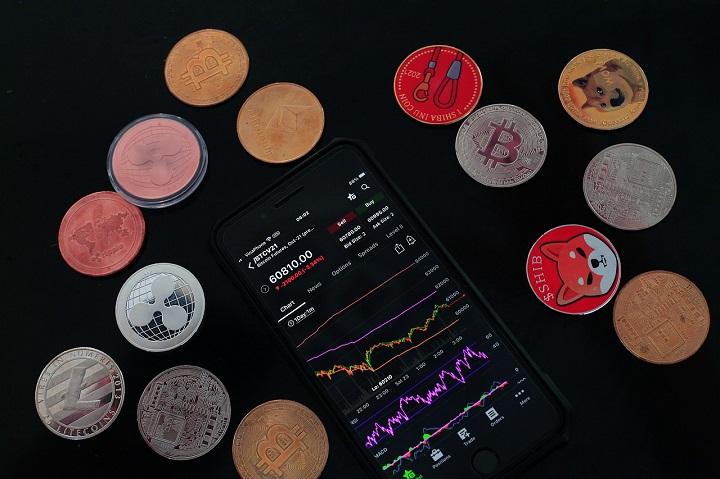This price-sensitive asset class could have either a positive or negative reaction to regulation.
By Paulina Likos|Reviewed by Tim Lawson|Jan. 28, 2022By Paulina Likos|Reviewed by Tim Lawson|Jan. 28, 2022, at 2:39 p.m.Will Regulation Affect Crypto Prices?
MoreThe Treasury recently released a report on stablecoins, digital assets that are used to help manage volatility in the crypto market.(Getty Images)
Bitcoin and other cryptocurrencies have many roles: speculative digital asset, currency, platform for smart contracts and even a store of value. But when it comes to regulating cryptocurrency, there is a lot of confusion around how it should be defined legally.
There is a regulatory framework for the securities market, so some market participants think there should be something similar for cryptocurrencies. At the same time, others fear that regulation could be overly restrictive and stifle innovation.
The purpose of increased financial regulation would be to protect investors, prevent fraudulent activity within the crypto ecosystem, provide clear guidance to allow companies to innovate in the crypto economy and address environmental concerns related to crypto mining. But regulation needs to strike the right balance. Too much or poorly targeted regulation might make it difficult to engage with cryptocurrency, which can curb its use. As it stands, crypto regulation can be confusingly general or ambiguous. Advocates of broader crypto adoption say there is a need to resolve the way the U.S. government views cryptocurrency.
Whatever comes out of government agencies' decisions will ultimately have a ripple effect on crypto investors and companies devoted to building out the future of the industry. Let's dig into what the consequences of crypto regulation may be for investors and the price of cryptocurrency assets:
[Read:
Sign up for stock news with our Invested newsletter. ]How Will Crypto Regulation Affect Investors?
A new round of crypto regulation is largely thought of as an important next step as the crypto economy continues to expand. With a more mature regulatory regime in place, cryptocurrency and digital assets could be seen as reaching the mainstream, with Bitcoin, Ether (ETH), stablecoins, other cryptocurrencies and nonfungible tokens becoming part of more investors' long-term strategies.
"Government regulation adds an air of legitimacy to the entire digital asset space," says Don Calcagni, chief investment officer at Mercer Advisors. "Digital assets are no longer this fad that's ultimately going to go away, but now digital assets are likely to become a very significant part of the future of finance," Calcagni says.
While the prospect of regulation has long caused fear within the crypto community, with concerns about suppressing growth and innovation, some market participants see a need to address several challenges preventing wider adoption, including scams, cyberattacks and money laundering.
"There is a real risk of the burdens of regulation stifling innovation for the benefit of legacy institutions and models, but there is also a real opportunity for more certainty on how to operate, evolve and innovate for the crypto industry," says Rishi Khanna, CEO of Stocktwits.

Despite widespread investor acceptance of digital assets, there are still those investors who remain wary of crypto investments. Experts say crypto regulation could add comfort for crypto skeptics.
[Read:
The History of Bitcoin. ]Many investors, Calcagni explains, are interested in digital assets but until now have remained on the sidelines due to the lack of investor protections and the lack of regulations surrounding digital assets. That said, financial regulation of cryptos could increase the flow of investors as they feel safer engaging in the crypto world.
Regulating cryptocurrencies could be a key element and healthy development for the industry. Greater regulatory guidance, if well targeted, can help reduce speculation among crypto assets in assets, as more institutional and individual investors come in, Khanna says.
"I expect to see more reporting and testing requirements for foundational platforms like exchanges. I also expect broader KYC/AML (know your customer/anti-money-laundering) requirements across the system, helping to protect against criminal activity, fraud and scams," Khanna explains.
Government regulation may also bring in banks and large companies that are interested in incorporating cryptocurrencies and decentralized finance projects into their businesses. With more access to capital, cryptocurrencies may continue to appreciate. This can also prop up other crypto assets, including altcoins, NFTs and the metaverse.
Khanna says a more certain regulatory environment would allow the industry "to move with more conviction and speed knowing there is one less existential threat."
An area of interest for policymakers is the amount of energy consumption required for cryptocurrency mining. The House Energy and Commerce Committee held a hearing on the energy impacts of cryptocurrencies. "As the industry moves forward, it is crucial for cryptocurrency networks to identify ways to reduce the need for constant high-volume energy use and minimize negative effects on the environment," Rep. Diana DeGette, a Colorado Democrat and chair of the Oversight and Investigations subcommittee, said in the hearing opening remarks. "We should be sure that as we develop novel and helpful uses for blockchain technology that we also minimize any resulting energy and environmental impacts," she remarked.
[See:
Why Does Crypto Crash? 6 Reasons. ]How Does the U.S. Government Regulate Cryptocurrency?
There is little financial regulation in the world of crypto, which can bring into question whether cryptocurrency is a safe investment for individual investors. Investing in cryptocurrencies means investing in speculative digital assets, with varying degrees of real-world usefulness. This results in volatile markets. As more participants allocate cryptocurrency to their long-term investment strategy, federal authorities are looking into how to view and regulate cryptocurrency:
Securities and Exchange Commission
The Securities and Exchange Commission has been paying attention to crypto from an investment perspective and in particular, how it can boost investor protections in this space. SEC Chairman Gary Gensler, who has previously referred to crypto as a highly speculative asset class, has said that while there are no plans for the SEC to ban cryptocurrency, digital assets need to be addressed in public policy frameworks. He noted that increased regulatory measures in crypto are needed to protect the growing number of investors who are actively participating in crypto trading from excessive market risks. The SEC approved the ProShares Bitcoin Strategy ETF (BITO), a Bitcoin futures exchange-traded fund that offers investors the opportunity to gain exposure to the world's most popular crypto without buying actual Bitcoins.
Department of the Treasury
The Treasury recently released a report on stablecoins, digital assets that are used to help manage volatility in the crypto market. The report explains the potential risks that stablecoins can present to investors that use decentralized finance, or DeFi, platforms, such as fraud, market manipulation and a lack of price transparency and urged oversight authorities to address these concerns. The paper called on Congress to "enact legislation to ensure that payment stablecoins and payment stablecoin arrangements are subject to a federal prudential framework on a consistent and comprehensive basis."
Internal Revenue Service
According to a recent IRS ruling, digital or virtual currency transactions are taxable, similar to transactions on any other property, and may be subject to reporting on tax returns. The IRS says it treats virtual currency as property for federal tax purposes. Taxpayers who receive virtual currency as payment for goods and services must include the fair value of the cryptocurrency measured in U.S. dollars.
Commodity Futures Trading Commission
The Commodity Futures Trading Commission, an agency that regulates U.S. derivatives markets, has said that Bitcoin and Ether, the crypto associated with the Ethereum network, can be considered commodities when traded as a contract for future delivery.
The Biden administration is reportedly teeing up an executive order to lay the groundwork for crypto regulation. This directive could present a government strategy on cryptocurrencies where it will call on federal agencies to determine crypto risks and opportunities, according to reporting by Bloomberg.
How Would More Regulation Affect Bitcoin's Price?
Industry experts say many people who are working in the field want regulation. Since there hasn't been a lot of formal federal guidance on crypto regulation, it can be difficult for leaders in crypto to build with certainty.
"We're looking for clarity and responsible regulation that encourages innovation that also protects individual investors and creates a level playing field," says Adam Carlton, CEO of the crypto wallet company PinkPanda.
Carlton says crypto prices could react positively if there is a framework that helps create innovation. But if it appears that there is a more stringent approach to crypto regulation, Bitcoin and other cryptos may lose value, he says. "Bitcoin and crypto has responded negatively when the government are posturing in a way that is creating some kind of ban or higher level of effort for miners, for example," Carlton says.
[SEE:
7 of the Best Blockchain Stocks to Buy. ]In July 2021, during testimony on Capitol Hill, Federal Reserve Chairman Jerome Powell discussed the possibility of a U.S. central bank digital currency, or CBDC, and how this could reduce or eliminate the need for cryptocurrency and stablecoins. Following these remarks, Bitcoin fell below its key support level of $30,000. A CBDC would be regulated, have a central authority and would have the backing of the Federal Reserve. CBDCs could add competition to cryptocurrencies because users may view CBDCs as being similar to a digital dollar and may feel safer since they would be backed by a central bank.
Investors need to take a global view of the cryptocurrency market because the assets are not tied to a particular country. This raises questions about how foreign government regulation could affect the prices of Bitcoin and other cryptos. China used to be a hub for crypto mining, but when the government started cracking down on Bitcoin mining operations due to concerns over mining energy consumption, Bitcoin's price dropped as much as 8% in a single day, along with a slump in other cryptos, like Ether and XRP, the token of the Ripple network.
7 Cryptocurrency Investing Strategies
Tags: cryptocurrency, bitcoin, investing, SEC, Treasury Department, IRS
Compare Offers
Compare Offers
Ad disclosure
Recommended Articles









